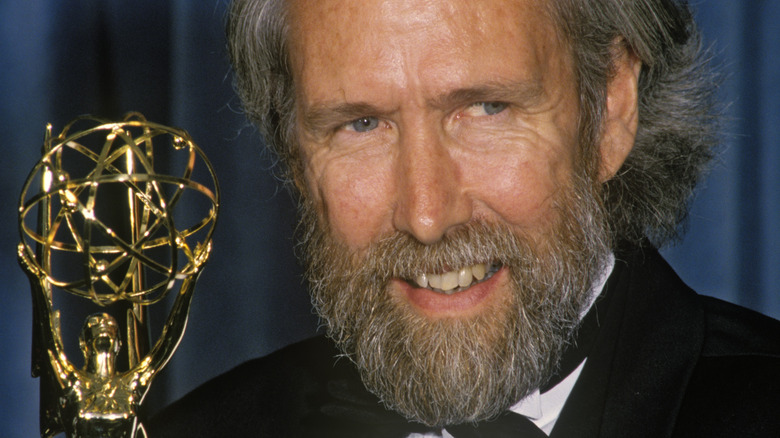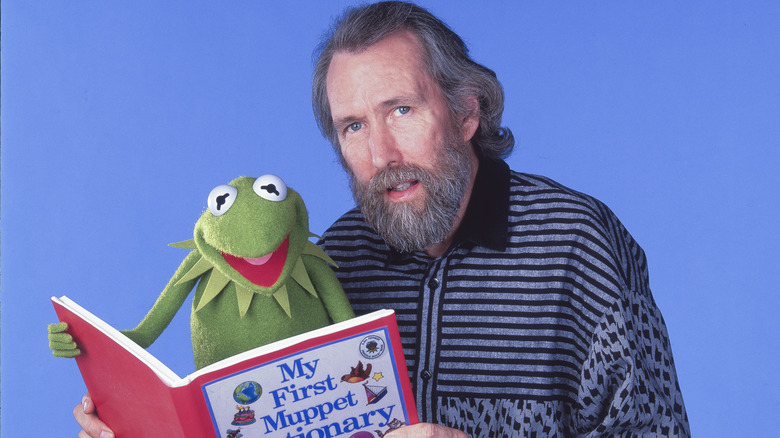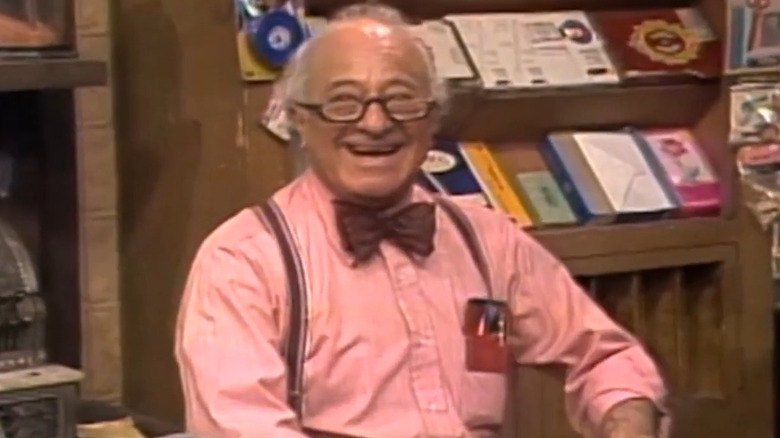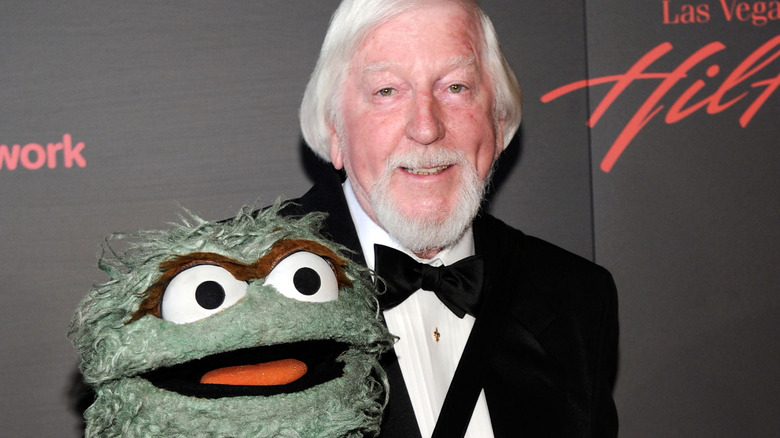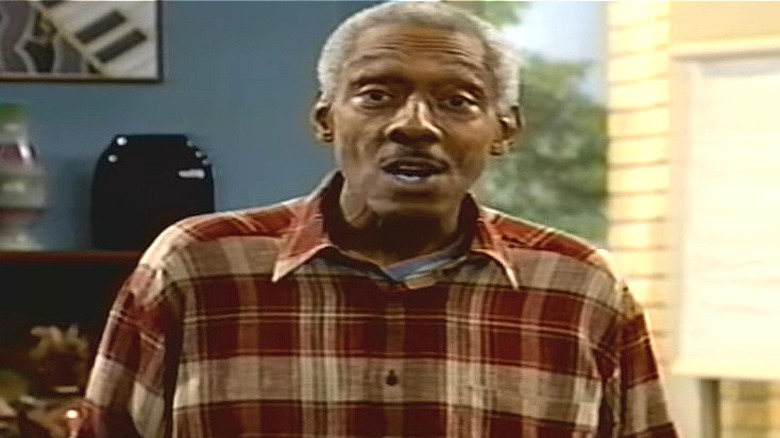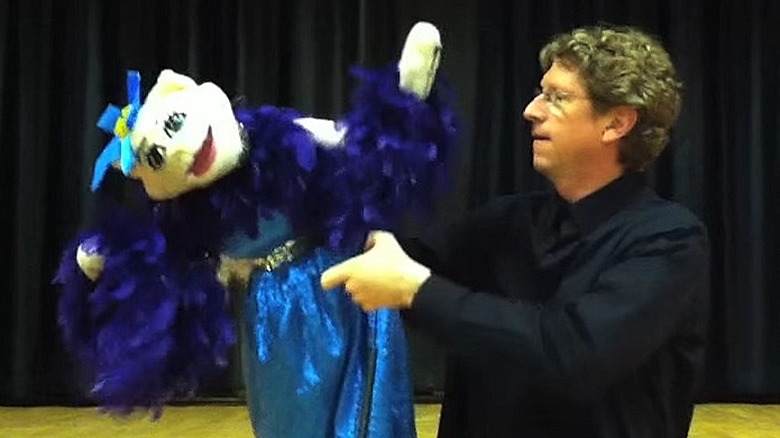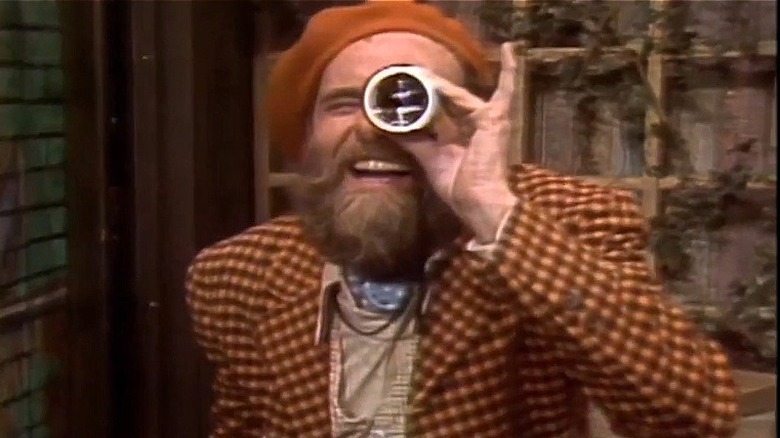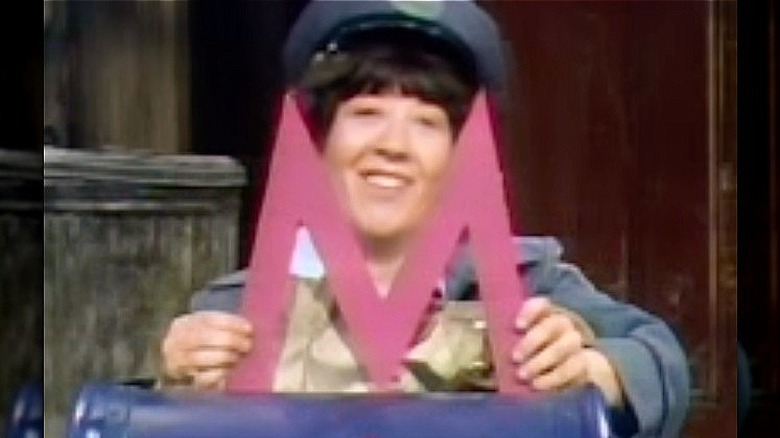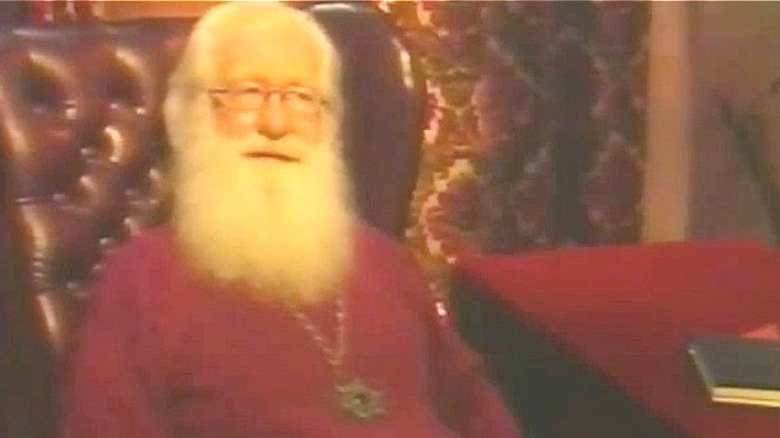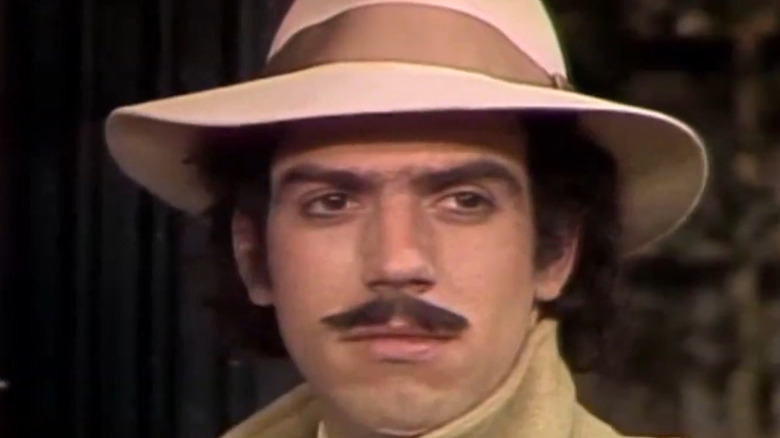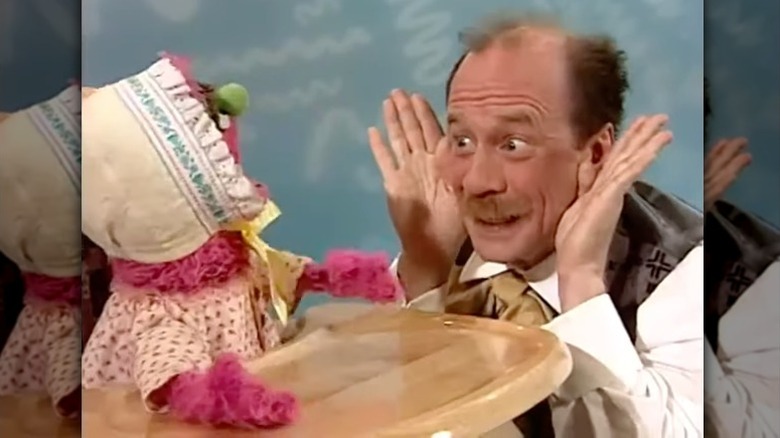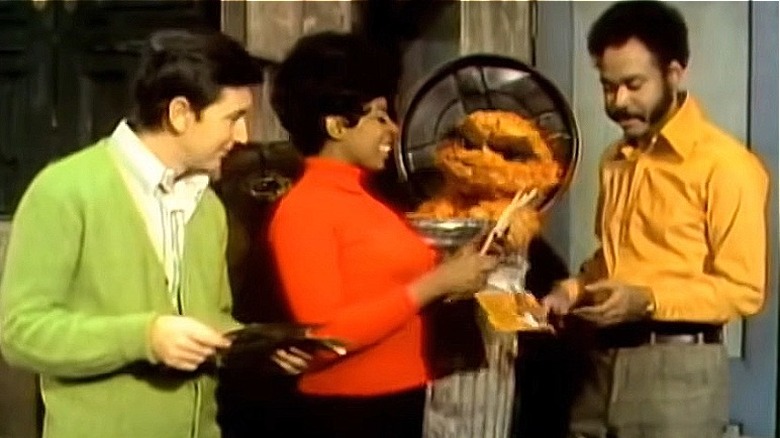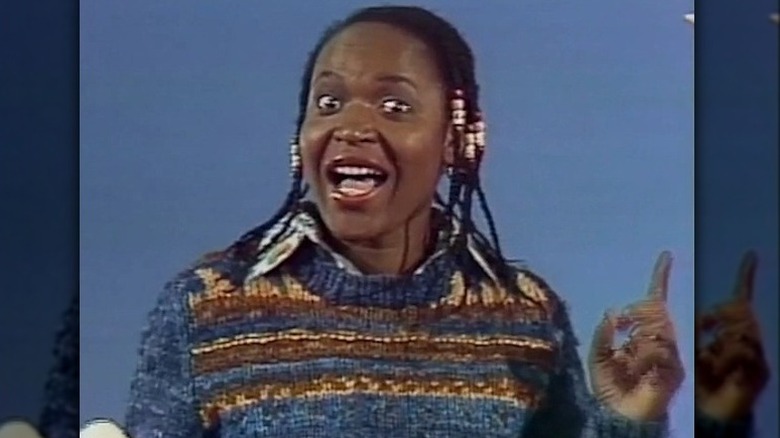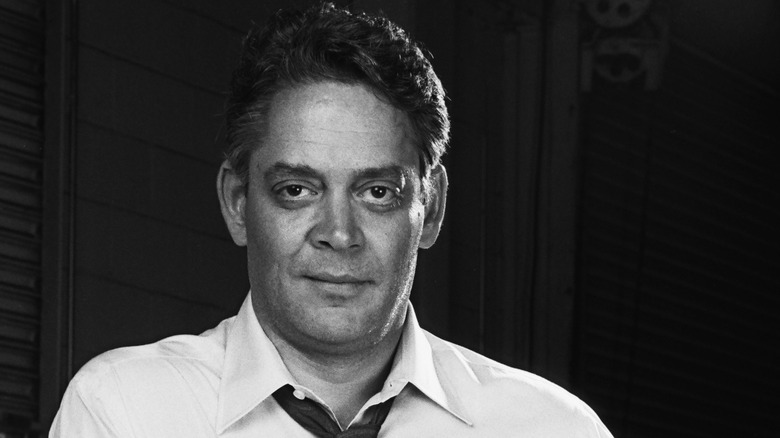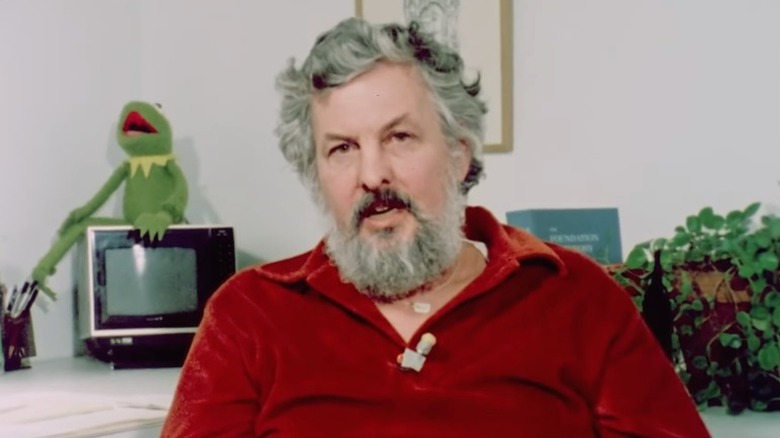Stars From Sesame Street You Didn't Know Died
In 1969, a group of television producers asked a seemingly simple question: could TV be used to educate children? Their attempt at an answer, a program called "Sesame Street," has been signifying to the affirmative for more than half a century.
An estimated 86 million Americans watched the the most awarded children's program of all time — the series has won 209 Emmy Awards -– over its first 50 years. So much of "Sesame Street's" success can be attributed to its playful, joyful approach to learning and its ability to talk to children at their level, rather than speaking down to them.
This approach wouldn't be possible without the energy and talents of the many cast members that have populated "Sesame Street" over the years. From those who work behind the scenes as puppeteers to those who take on a more human role, a whole host of performers have poured their hearts and souls into the work for the last five decades.
Unfortunately, many of these cast members are no longer with us. Here's a look at the beloved "Sesame Street" cast members we've lost over the years.
Jim Henson
An innovator and visionary, Jim Henson was the mastermind behind the Muppets that have inhabited Sesame Street for over five decades. He got his break on a Washington, D.C., children's program back in 1954, but Henson really hit the big time in 1969 when Joan Ganz Cooney tapped him to create a crew of puppets for a new educational program she was working on called "Sesame Street."
The first characters Henson created for the show included Bert & Ernie, Oscar the Grouch, and, of course, Big Bird. These larger-than-life (literally, in some 8-foot-2 cases) puppets taught children their ABCs and 1-2-3s, and the characters imparted lessons on topics including empathy, death, and friendship.
Despite the fact that these characters brought Henson's career to new heights, the puppeteer wasn't always thrilled with their success. Joan Ganz Cooney recalled in an interview with the Television Academy Foundation, "He called in about 1972 with a cri de coeur one Saturday, saying 'You've destroyed my life ... My worst nightmare has now occurred: I am taken as a children's performer.'"
Ganz Cooney assured him that he'd break out of that box, and, with the success of such esteemed projects as "The Muppet Show" and "Fraggle Rock," he certainly did, establishing himself as a "puppeteer for people of all ages," as The New York Times put it. Then, in 1990, the magic was cut short when Henson was hospitalized with breathing difficulties. The following day, he died of streptococcus pneumonia at the age of 53.
Will Lee
While Jim Henson's death is arguably "Sesame Street's" most significant loss, Will Lee's absence was certainly felt, as well. Born in Brooklyn in 1908, Lee was a member of the Federal Theater Project and served in Army Special Services during WWII (per The New York Times), before joining the "Sesame Street" cast at the very beginning, in 1969.
One of the four original human characters on the show, Lee played Mr. Hooper, the curmudgeonly grocery store owner who has a soft spot for the neighborhood's yellow feathered resident. In 1970, he told Time, "I was delighted to take the role of Mr. Hooper, the gruff grocer with the warm heart. It's a big part, and it allows a lot of latitude. But the show has something extra, that sense you sometimes get from great theater, the feeling that its influence never stops."
In that respect, he was right — his influence really never did stop, even after his death. See, when Lee died of a heart attack in 1982, "Sesame Street" responded by addressing his character's death on screen. The episode, titled "Farewell, Mr. Hooper," frankly discussed death and dying, a complicated subject that no children's series (save for "Mister Rogers' Neighborhood") was willing to touch with a 10-foot pole. This sort of teachable moment became the series' calling card, solidifying it as one of the greatest educational programs of all time.
Carroll Spinney
For almost 50 years, Carroll Spinney taught children their numbers and letters as Big Bird and Oscar the Grouch. The Massachusetts-born puppeteer found his love for the craft early in life, buying his first puppet, a monkey, at a rummage sale as an elementary schooler. In a PBS interview in 2003, Spinney described how Jim Henson found him while he was doing a live show called "Picklepuss and Friends," saying, "Everything went wrong. [Henson] came backstage afterward and said 'I liked what you're trying to do. ... Listen, I'm going to work with a show named 'Sesame Street.' I'm going to build a bird ... and a very grouchy character. Would you be interested?'"
The rest, as they say, is history. Carroll took over the characters, voicing them until 2018 when a condition called dystonia, which causes involuntary muscle contractions, forced him into retirement. He attributed his success with audiences to the fact that he did not forget what it was like to be a child, telling The New York Times, "I never got over it. It was almost a problem for me, in fact, trying to grow up enough, even when I went into the Air Force."
In 2019, at the age of 85, Spinney died at his home in Connecticut.
David Smyrl
Keeping Mr. Hooper's (Will Lee) shop open was David Smyrl, who succeeded Leonard Jackson as Mr. Handford, the retired firefighter and proprietor of Hooper's Store. Born in 1935 in Philadelphia, Smyrl began acting in the 1970s. Pre-"Sesame Street," he was best known for his writing on "Benson" and his writing and acting on "The Cosby Show."
In 1990, he joined the cast of the children's series, playing a lighter, happier, and more prone-to-song version of Mr. Handford. He seemed to enjoy the role, telling Connecticut's Record-Journal, "You get to act stupid. It's fun! I get to do fun things like dance with Gloria Estefan (via AP News).
Though he retired from "Sesame Street" in 1998, fans still remembered him fondly, with one tweeting, "Even as a little kid, I could get his wisdom [and] kindness. RIP David Smyrl" (via BuzzFeed News). In 2016, the actor died from lung cancer, as reported by his wife Cheryl (via AP News).
Michael Earl
As is the case with many "Sesame Street" actors, Michael Earl found his love for puppetry at a young age. At 8 years old, he was putting on his own puppet shows, honing his skills enough that as a teenager, he impressed puppeteers Kermit Love and Mike Oznowicz. "It was not until Jim Henson's funeral did I know that Mike had called Jim and Frank [Oz] telling them about me, urging them to hire me, which they did, sight unseen for 'The Muppet Movie.' I had just turned 19," Earl said in an interview with ToughPigs. It wasn't long before Jim Henson invited the youngster to join the "Sesame Street" cast as the new Mr. Snuffleupagus, replacing Jerry Nelson.
During his time on the series, Michael Earl took on a number of other characters, including Slimey the Worm (Oscar the Grouch's pet) and Forgetful Jones (an original character created just for him). He told fan blog Muppet Mindset that he loved his time on the series, especially since he started out as a young fan of the show. "It feels humbling. I was very fortunate to have had such an amazing opportunity, and at such an early age ... Yeah, it was pretty exciting!"
Eventually, Earl opened his own puppetry school called Puppet School, which offered classes in New York, L.A., and Seattle (via Muppet Mindset). In 2012, he was diagnosed with colon cancer, and in 2015, at 56 years old, he died from the illness.
Jerry Nelson
Before Michael Earl became Mr. Snuffleupagus, there was Jerry Nelson. Though he was the first actor to control the front end of the massive puppet (via The Hollywood Reporter), Nelson is actually better known for his second character on the show, the number-obsessed vampire Count von Count.
Nelson first met Jim Henson in the 1960s, when both men were working as freelance puppeteers in New York City. Their creative partnership really blossomed during the decades they worked together on "Sesame Street" when they created half a dozen Muppet characters, including Mr. Snuffleupagus, Count von Count, Sgt. Floyd Pepper, Dr. Julius Strangepork, Camilla the Chicken, and Robin (Kermit's nephew). Jerry voiced them all.
In fact, he was such an accomplished talent that his colleagues, including the great Carroll Spinney, "called him 'the voice'" because "he could do anything," Spinney told ToughPigs. And he did it all, at least, until his declining health convinced him to give up the physically demanding job. In 2012, Nelson died in his Cape Cod home. Jim Henson's daughter and the CEO of his company, Lisa Henson, made a statement in Jerry Lewis' memory on the studio's Facebook, noting his "gentle, sweet whimsy and kindness that were a part of his own personality" (via The Hollywood Reporter).
Charlotte Rae
Prior to her big break on "Diff'rent Strokes," which led to her most memorable role on "The Facts of Life," Charlotte Rae starred on "Sesame Street" for a single season. From 1971 to 1972, the actor played Molly the Mail Lady, delivering letters — including occasional letters of the alphabet — to the residents of the neighborhood.
Born in Milwaukee in 1926 to Russian Jewish immigrants, Rae got involved in the theater early on and made her Broadway debut in 1952 (per The Hollywood Reporter). And though she had a long and storied career as a performer, it wasn't always an easy one. During her time on "Sesame Street," Rae, who had been struggling with alcoholism for some time, "spiraled out of control" (per MeTV). She identified the show's strenuous hours as a factor behind her addiction and admitted that she went to her first Alcoholics Anonymous meeting after "Sesame Street's" Season 3 wrap party.
At the time of her death, in 2018, Rae had been sober for 43 years. The "Sesame Street" Twitter account honored the actor, saying "Charlotte was a friend to all and she will be greatly missed on Sesame Street."
Kermit Love
Willy the Vendor, "Sesame Street's" favorite hot dog man, might not be a character you remember well, but the actor who played him, Kermit Love, was integral to the development and success of the series. A costume designer by trade, Love helped create the Big Bird, Cookie Monster, and Mr. Snuffleupagus characters we know so well.
In 1935, Love began his career designing puppets for the federal Works Progress Administration theater. Eventually, he moved on to design costumes for Orson Welles' theater and the New York City Ballet, before turning to children's programming. A firm believer in the use and power of one's imagination, he told The New York Times about his work on "Sesame Street," "You know, the most important thing about puppets is that they must project their imagination, and then the audience must open their eyes and imagine."
In 2008, Love's partner for 50 years, Christopher Lyall, told The New York Times that Kermit had died from congestive heart failure. His former colleague, Carroll Spinney, remembered Love in Variety, saying, "Kermit was definitely a totally unique person. "He looked very much like Santa Claus but was a little bit more like the Grinch."
Richard Hunt
An integral, if lesser-known, member of the "Sesame Street" cast, Richard Hunt was the puppeteer behind Don Music, Sully the construction worker, Forgetful Jones, Gladys the Cow, Placido Flamingo, and Elmo (for a single year). He also joined Jim Henson on "The Muppet Show" playing Janice, Scooter, Beaker, Statler & Waldorf, and Miss Piggy (for one season). Hunt joined the "Sesame Street" cast in 1972, at 19 years old, after cold-calling Henson's team a couple years prior (per LGBTQ Nation).
For the next twenty years — the rest of his life — Richard worked on the series, becoming a mentor to the newer cast members and saying yes to every other Muppets-based project he was offered. In the late '80s, he was diagnosed with HIV, and in 1992, he died of complications from AIDS.
Upon his death, Brian Henson told the Associated Press, "His endless talents, great wit, and indomitable spirit will be deeply missed by all of us ... and I will miss a best friend and a big brother." Meanwhile, "Sesame Street" producer Jon Stone said, "It's impossible to imagine a world without Richard. He came to us a wild-eyed 18-year-old and grew into a master puppeteer and inspired teacher."
Michael Jeter
Michael Jeter played Mr. Noodle in the "Elmo's World" segments of "Sesame Street," beginning in 2000. He took over the part after Bill Irwin, the original Mr. Noodle, became unavailable.
The role, while one of his favorites, was far from his only notable part. In 1990, Jeter won a Tony for his performance in "Grand Hotel," and he won an Emmy for his work on "Evening Shade" in 1992. At the time of his death, his publicist told the Associated Press, "Kids would recognize him and come running up to him, 'Mr. Noodle! Mr. Noodle!' He really loved that."
In 2003, at just 50 years old, Michael Jeter was found dead in his home. It was later noted that he was HIV-positive, but the cause of his death was never revealed publicly, as he reportedly was in good health prior to his passing (via the Associated Press). His last project, the Christmas movie "The Polar Express" was finished posthumously, as the actor had completed enough of his scenes that his character was able to be preserved.
Matt Robinson
"Tough Pigs," a Muppets fansite, wrote that Matt Robinson is "arguably the most important and influential person of color to have ever worked in the Henson worlds." Originally tasked with overseeing the series' diversity, Robinson was eventually cast as Gordon, one of the first human characters on the show, after another actor didn't work out. He also voiced the puppet Roosevelt Franklin.
According to the outlet, and as evidenced by his work on the series, Robinson "[provided] crucial input on how to teach kids about tolerance, acceptance, and the importance of diversity." He ensured that the show didn't only help children master academic concepts, but social and emotional skills as well.
In 2002, Robinson died from Parkinson's disease. Roscoe Orman, a successor to the Gordon role, remembered Robinson as "one of the most amazingly eclectic creative types that [he'd] ever [known]." After his stint on "Sesame Street," Robinson went on to write for very successful sitcoms, including "The Cosby Show," "Sanford and Son," and "Eight is Enough."
Alaina Reed Hall
Gordon's sister Olivia arrived on "Sesame Street" in 1976. Played by Alaina Reed Hall, the character appeared in dozens of skits with Roscoe Orman (who played Gordon at that time), teaching kids about sibling relationships. Per The New York Times, the Ohio-born actor held a number of roles in addition to being a regular cast member on the children's series. Among them were turns on Broadway shows including "Chicago" and "Hair," movies such as "Death Becomes Her" and "Cruel Intentions," and landmark TV series "ER, "227," and "A Different World." But it was her turn as Olivia that she is perhaps best remembered for, which seems fitting as she spent over a decade in the neighborhood.
In the late 1980s, Hall sang her last song at 123 Sesame Street and retired from her series regular role. Then, in 2009, she died of breast cancer. Relatively private in real life, not much is known about Ms. Hall, other than the fact that she was survived by her husband and her two children.
Raul Julia
Years before he hit the big screen as Gomez, the ghoulish patriarch of "The Addams Family" 1990s movies, Raul Julia was teaching children Spanish on "Sesame Street." His character, Rafael the fix-it-man, only appeared on the show for a single season in the early 1970s.
Born in Puerto Rico, Julia spent most of his career wowing audiences on stage in Broadway productions including "The Castro Complex" and "Two Gentlemen of Verona," and with projects on the big screen. But it was his groundbreaking role in "Sesame Street," as one of the only Latino characters on television at the time, that he will most certainly be remembered for.
When he died in 1994 of complications following a stroke, a viewer wrote to The New York Times: "Your Oct. 25 obituary on Raul Julia neglected to cite one of the actor's activities that touched the lives of countless people well before 'The Addams Family.' I vividly recall the warmth, charm, and intelligence of Mr. Julia's character in the 1970 debut season of 'Sesame Street.' His English and Spanish rendition of 'Sing, Sing a Song' never failed to captivate me and my young daughter."
Jon Stone
Though he rarely appeared on screen, "Sesame Street" would not be the same without Jon Stone, one of the series' three original producers. Stone wrote the show's pilot episode, helped fashion the characters of Big Bird, Cookie Monster, and Oscar the Grouch, and was the show's principal director until 1996 (per the Chicago Tribune).
Joan Ganz Cooney, "Sesame Street" creator and fellow producer, shared (via The New York Times) that Stone's "reputation was that he was probably the most brilliant writer of children's television material in America." High praise, yes, but certainly earned. Frank Oz, a puppeteer who had been with the series since its inception, likewise commended Stone for being "the major creative force" of the show.
Stone won 18 Emmy Awards for his achievements in children's television programming (per The New York Times). Later in his career, he worked on several other Muppet and "Sesame Street" projects, and he wrote the beloved story "The Monster at the End of This Book." In 1997, Jon Stone died of Lou Gehrig's disease.

